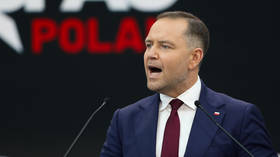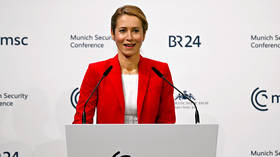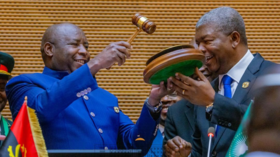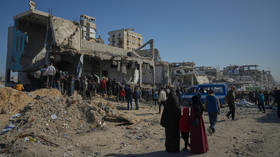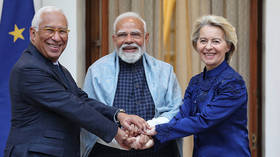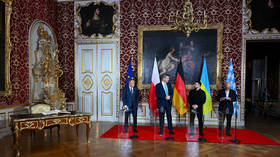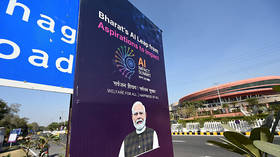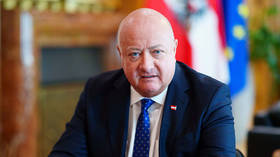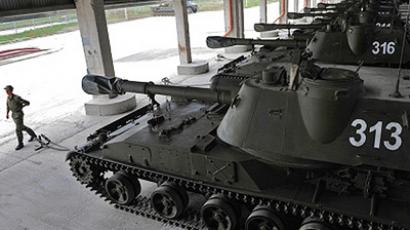Russia must prepare for new “Times of Troubles” says military analyst
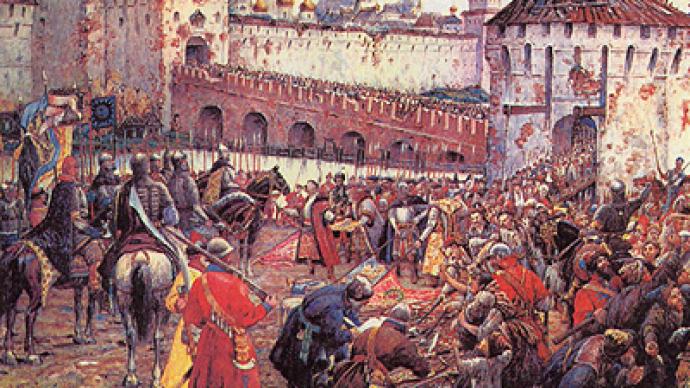
A well known military analyst says Russia will experience serious challenges and even threats from the two global powerhouses, the worst threat of its type since 1612, and offers sound advice.
Makhmud Gareyev, Military Sciences Academy President General of the Army, said in a report that Russia must prepare for a two-pronged squeeze, one from the East, the other from the West."Our country will come under huge geopolitical pressure in the coming years, primarily from the United States and China,” Gareyev said in a report at an Academy meeting, “and we need to do all we can…to prevent a collision course with the U.S. and China." Gareyev recommends defusing the potentially explosive situation with a kid gloves diplomacy.The Russian political elite must “do all we can, using political-diplomatic means in the first place,” to nip the threat in the bud, he advises. Gareyev then discussed the “global nature” that modern warfare is taking, especially when it is considered that American forces are on the ground in Iraq and Afghanistan, and now helping to control the skies over Libya, which is presently experiencing a UN-sanctioned battle between pro-Gaddafi loyalists and anti-government militants.Meanwhile, China is steadily enhancing its military in leaps and bounds. This fact was underscored in January when Beijing timed a test flight of its secret J-20 stealth bomber with a visit by US Secretary of Defense Robert Gates. Ouch. One observer said it was an “unusually bold show of force by the communist nation.”All of this lessens the likelihood that future conflicts will remain at the local level."It is difficult to hope that future wars will only be regional or local. U.S. military forces are present in any strategic direction – west, south, east and north," the military analyst said.How serious is the threat? Gareyev believes Russia hasn’t witnessed such a “crunch” in 400 years, a dark chapter of Russian history known as the “Time of Troubles" [1598-1613] when the Motherland was ravaged by a famine, as well as foreign invaders."Regarding security, Russia has never been in such a crunch as in the early 21st century since, perhaps, 1612," he admitted.In order to confront this rising threat, Gareyev recommends Russia assess the risks realistically and objectively. He even had a few choice words for the “ultra-liberal” camp and experts of particular non-governmental organizations, who “keep tricking the public” into believing that there are no storm clouds looming on the horizon."This [chicanery] is done very conditionally, ambiguously and in a roundabout way,” the Academy president said. “Ultra-liberal politicians and analysts, and experts of non-governmental organizations, keep tricking the public into believing that nothing threatens Russia.”Meanwhile, spending on defense and even patriotism are described as “far-fetched and archaic" initiatives, he added.In conclusion, Makhmud Gareyev warned that if Russia did not take the initiative in the face of the increasing risks, the enemy will only will be too happy to set these tasks itself."Threats and defense tasks are an objective reality,” he stressed. “If threats are not neutralized politically, it will be impossible to abolish them…and the enemy will set these tasks to us, as in 1941.”An eye on future warsMeanwhile, with Russia straddling the active fault line between the United States and China, the Russian General Staff announced it will reject obsolete military hardware from defense industries if the Armed Forces has no use for it. "We need more advanced armaments with certain parameters, but many producers do not want to make such [items],” Chief of the Russian General Staff Nikolai Makarov said at the Academy of Military Sciences on Saturday. “They make the products they can make and try to push them on the Armed Forces. We do not need that.”The Chief of the General Staff did not mince his words, harshly rebuking the military’s R&D arm for failing to produce state-of-the-art weapons of war over the last two decades."We failed to reach modern standards in warfare, and lived with outdated ones in the past 20 years,” Makarov railed. “The world was developing space technologies, information and control systems…while we were focused on a large army and buying obsolete weapons from the defense sector. We missed the development of war methods and means.”In August 2009, Makarov announced that Russia was taking a radical step and purchasing several French Mistral class amphibious assault ships (LHD). Some Russian military observers interpreted the unprecedented move as a marked decline in Russia’s ability – or willingness – to develop such sophisticated weapons of war.The criticism seems slightly unwarranted, however, especially when it is considered that more and more countries are willing to “subcontract” the research and development of particular technologies to third parties. Furthermore, Russia’s military-technological prowess remains world-renowned on several fronts, including in the development and production of missiles, tanks and fighter jets, known as the classical “core” weapons of modern warfare.Nevertheless, Makarov is delivering a wakeup call to the Russian defense industry, telling them that he will no longer buy whatever is deposited at his doorstep. If anything, the harsh rebuke should intensify cooperation between the military commanders and the defense industries, perhaps ushering in more “think tanks” to decide what will be required to fight – and win – future wars.2020-2025 The Chief of the General Staff revealed that the military conducted a thorough analysis of wars and conflicts that had a high chance of occurring in the period from 2020 to 2025, and weighed them against the requirements of the Armed Forces. "These requirements were included in tactical and technical characteristics and presented to the [defense] industry in February 2010,” Makarov said. “The document said that certain military products would fail the missions of the next ten years due to their technical parameters.”Makarov, as the highest ranking military officer, basically said that such a situation would not continue on his watch."Being the General Staff Chief, I am in charge of combat missions and I will buy what I need instead of what I am offered,” he said. “That is an absolutely concrete and clear approach.”Makarov even mentioned the “events of August 2008” [a reference to the five-day Georgian-Russian conflict, which was sparked when Tbilisi made an ill-advised attempt to take over South Ossetia with a crack-of-dawn artillery assault, prompting a clash between Georgian and Russian forces], which forced the military command to take a drastic turn. The Chief of the General Staff said the rush to reform the Russian military, essential and unavoidable as it was, may have overlooked some key considerations."We urgently needed to overcome the crisis in the Army,” Makarov explained. “As a result, we started the reforms without sufficient academic recommendations.”Meanwhile, there are other problems plaguing the Russian military. Much like its American counterpart, Russia is suffering the burden of inflationary defense costs. Makarov complained about the price of a T-90 tank, for example, which cost 42 million rubles just three years ago, but now comes with a 100 million-ruble price tag. "No one can explain why," he observed.Who will fill the boots of the Russian Army?As the Russian high command puts out the call for state-of-the-art weaponry, there remains yet another enemy nibbling at Russia’s flank that has nothing to do with a foreign aggressor: dismal demographic rates.Russia’s population shrank by 1.6 per cent between 2002 and 2010, and now totals 142,905,200, the federal statistic agency Rosstat said in a tentative report on the national census, conducted in October 2010, which was published by Rossiiskaya Gazeta on Monday.According to the preliminary census results, the number of females [76.7 million] considerably exceeds that of the males [66.2 million]. The difference was calculated at 10.515 million in 2010 versus 9.956 million in 2002.Demographic experts blame the slightly worsening ratio on a high rate of premature deaths among men.Now, the General Staff of the Russian armed forces must take into consideration the nation’s demographic situation in drafting people for military service, Makarov acknowledged."We are able to draft just 270,000 young men now,” he said. “We don't have more."When the decision was made to set the size of the armed forces at 1 million, the demographic decline was taken into account."Some are suggesting: let's make the army five or six million people in size,” he said. “But we don't have people for this in Russia.”Nevertheless, even with its current demographic problems, Russia boasts the fourth largest military in the world, with just over 1 million active personnel and 20 million reserve troops.Makarov said the Russian military will eventually adapt a recruiting structure similar to those of NATO member states, slowly phasing out its conscript-based system in favor of recruiting contract troops."For example, the Czech Armed Forces have a small number of conscripts, about 10-15%. We will have the same at some point," the Chief of the General Staff said. The recent decision to enlarge the number of contract servicemen in the Armed Forces to 425,000 "is just the first step," he said. "We will be moving further, towards a contract Armed Forces.”Makarov also cited as a positive example the Polish Armed Forces, in which contract servicemen show up for military service like a regular job, arriving at 8:00 a.m. for training and going home at 4:00 p.m.It may even give Russian troops enough time to beat, in addition to any future adversary, the evening rush hour as well.Robert Bridge, RT


